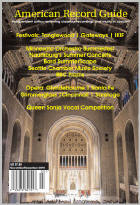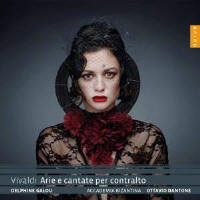Texte paru dans: / Appeared in:
|
|||||||
|
Outil de traduction ~ (Très approximatif) |
|||||||
|
Reviewer: Charles
Brewer
These two new releases in the Naive Vivaldi series both contain works for the alto voice, one sacred works and the other secular cantatas and opera arias. The soloist on both is Delphine Galou, whose technique and dramatic interpretations surpass any of the competition.
The sacred collection consists of four complete works, two of the Introductione al Miserere (Filiae maestae Jerusalem, R 638, and Non in pratis, R 641), the hymn Deus tuorum militum (R 612, with tenor Alessan-dro Giangrande), and the Salve Regina (R 618), along with the incom-plete Regina Coeli (R 615). Galou has a much richer voice than Nathalie Stutzman on Robert King’s complete recording of Vivaldi’s sacred music (M/J 2006); and, as musical as the countertenors James Bowman and Robin Blaze are on King’s collection, Galou is much more consistent through her whole range. The same comparison can be made with Jaroussky’s Erato recording of R 618 and 638. The Concerto Per la SSma Assontione di Maria Vergine (R 582) for two orchestras is added as a filler here.
The secular collection includes three cantatas, the often recorded Cessate, omai Cessate (R 684) and two for which this release appears to be the only available recording, O mie Propore piu Belle (R 685) and Qual in Pioggia Dorata (R 686). The remaining selections are alto arias from the operas La Candace, Il Giustino, Tito Manlio, Tieteberga, and La Verita in Cimento. As with the sacred repertoire, in comparison with other recordings of Cessate, omai Cessate (such as Derek Lee Ragin, J/F 1990), Galou’s voice is more colorful, flexible, and has the edge over even Andreas Scholl (J/A 1996, which also includes Filiae Maestae Jerusalem). Her strongest competition in this cantata is Anne Sofie von Otter, included on a collection of laments (J/F 2000: 229), but while Von Otter is perhaps a little more dramatic, her Italian diction also sounds forced in comparison with Galou.
An additional enticement of both new recordings is the dramatic and supportive accompaniments. This is clearly evident in the Concerto Per la SSma Assontione di Maria Vergine with Alessandro Tampieri as violin soloist (who contributes his own extravagant cadenza), which is much more dramatic than the earlier recording by Giuliano Carmignola (Divox 79605).
The booklets include texts and translations.
| |||||||
|
|
|||||||
|
|
|
||||||
|
Cliquez l'un ou l'autre
bouton pour découvrir bien d'autres critiques de CD |
|||||||





